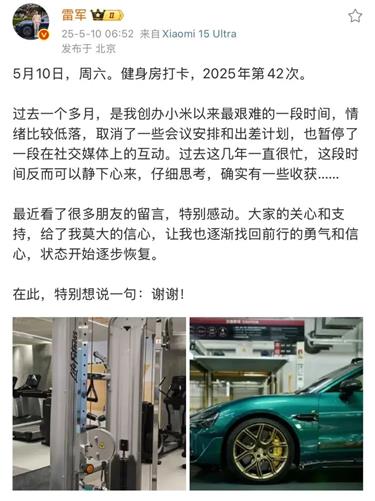Xiaomi Auto under fire: false claims, crash, and a crisis of credibility

Xiaomi Auto founder and CEO Lei Jun addressed attendees at the company's booth during the Beijing Auto Show on April 25, 2024.
Xiaomi Auto and its founder and CEO Lei Jun are navigating what appears to be the most turbulent period since the company entered the electric vehicle market four years ago.
A series of high-profile controversies has pushed the automaker into the media spotlight, but not for the reasons it might have hoped.
The challenges culminated on May 10 when Lei acknowledged on Weibo: “This past month has been the hardest since I founded Xiaomi.”
Lei, once celebrated as a visionary for steering Xiaomi from smartphones to smart mobility, had boldly declared that the company’s auto division aims to become one of the world’s top five carmakers within 15 to 20 years.
But as scrutiny mounts over the SU7 electric sedan and Xiaomi's corporate culture, that ambition is being severely tested.

Lei Jun said on Weibo on May 10: “This past month has been the hardest since I founded Xiaomi.”
Performance claims under fire
The latest controversy involves the 42,000 yuan (US$5,821) carbon fiber hood offered as an upgrade on the SU7 Ultra. Marketed as a cutting-edge feature with air ducts for cooling and aerodynamic gains, the hood was billed as a performance-enhancing component.
However, customers soon questioned its functionality after airflow tests revealed that the vents had no meaningful effect — with teardown videos showing they were not connected to any brake cooling or downforce system.
In viral videos, customers demonstrated that a tissue placed over the vents remained unmoved even under forced airflow.
At least 400 customers have reportedly demanded full refunds, and legal experts warn that if Xiaomi’s advertising is proven misleading, it could be in violation of China’s Advertising Law and Anti-Unfair Competition Law.
This was not the only controversy Xiaomi faced over misleading claims.
At the launch of the SU7 Ultra, the company touted a maximum vehicle horsepower of 1,548. However, an April 30 software update revealed that this peak power could only be unlocked after achieving specific track performance, with the standard output limited to around 900 horsepower.
Although Xiaomi apologized and responded that this design was intended to enhance driving safety, the move dealt another blow to the brand's credibility.
Adding to the storm, Xiaomi’s internal working culture came under fire in April after reports emerged that the company allegedly imposed a minimum 11.5-hour average workday for employees at its automotive division.
Those failing to meet the threshold reportedly had to submit written explanations, and those logging fewer than 8 hours risked disciplinary action or dismissal.
For a company that long prided itself on “building friendships with users,” the employee pressure reportedly happening behind the scenes painted a starkly different picture and sparked widespread backlash on Chinese social media.

The charred wreckage of a Xiaomi SU7 after a crash in March in Anhui Province claimed three lives.
All these controversies follow a fatal SU7 crash in March in Anhui Province that claimed three lives. The vehicle was operating in assisted-driving mode before the driver took over shortly before the accident, Xiaomi said.
The incident triggered government action: On April 16, the Ministry of Industry and Information Technology announced that automakers must clarify the system's functional boundaries and safety response measures, while strictly prohibiting exaggerated or false advertising.
In response, Xiaomi slammed the brakes on its "intelligent driving" advertising and replaced the term with "assisted driving."
Lei has long positioned Xiaomi Auto as a challenger brand aiming to become one of the world’s top five carmakers. The company’s initial momentum — fueled by sleek marketing, an aggressive pricing strategy, and founder Lei's personal charisma — was undeniable.
In a widely publicized marketing move, Lei personally opened car doors for SU7 buyers during the model’s first delivery day in March. His down-to-earth demeanor over the years has underscored Xiaomi’s user-first image and cultivated emotional loyalty among early adopters.











